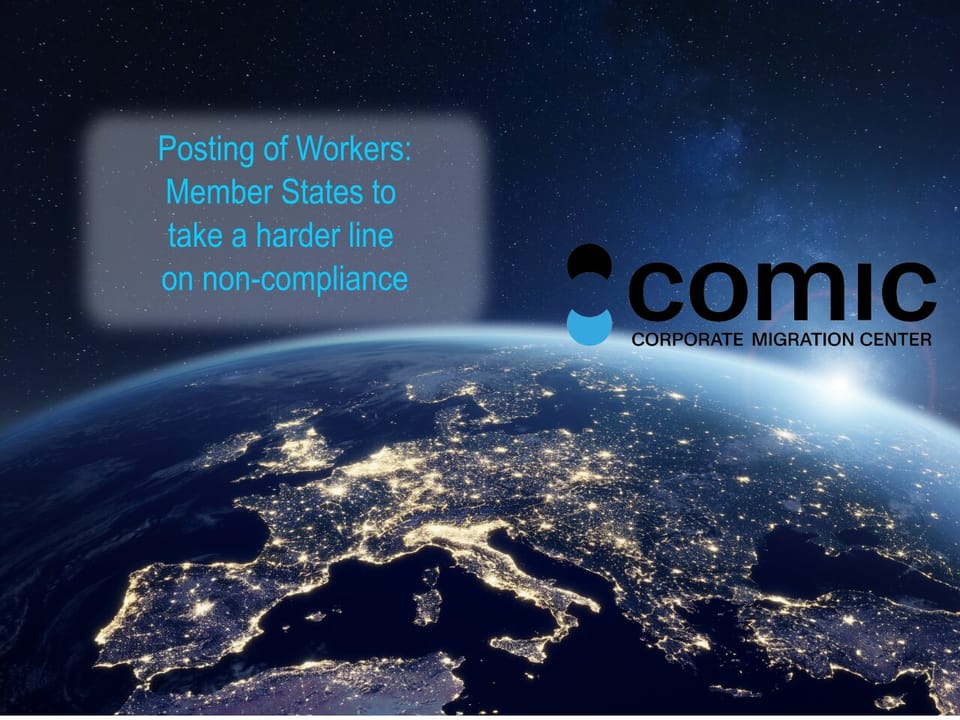Posting of Workers - Member States to take a harder line on non-compliance

As a result of irresponsible behaviour of certain companies posting workers in the framework of transnational provision of services, and respectively of certain recipients of services, EU Member States are toughening sanctions for failure to comply.
One of the significant issues targeted is the economic exploitation (i.e., labour abuses to the detriment of posted workers).
As regards the concept of economic exploitation, Member States are looking to bridge the legal gap between labour abuses in the meaning of existing national law provisions, and trafficking in human beings (defined as forced labour or services).
To that end, amendments are focused on aggravated economic exploitation, the aggravating factor being introduced mainly in relation to substantial underpayment, non-declaration of working hours, unsafe working conditions, poor housing.
In Belgium, the Social Criminal Code was amended to toughen inter alia the sanctions for failure to pay the remuneration due to workers.
Under certain circumstances, the failure to pay the minimum remuneration due in accordance with the applicable collective agreement, is sanctioned with imprisonment of six months to three years, and a criminal fine of EUR 4800 to EUR 56000, or with one of these penalties only, or with an administrative fine of EUR 2400 to EUR 28000. Fines are multiplied by the number of workers concerned and capped to maximum amount multiplied by 100.
The failure to pay the full remuneration due in accordance with the applicable collective agreement (i.e., including all due supplements), is sanctioned with criminal or administrative fines as well (multiplied by the number of workers concerned, and capped to maximum amount multiplied by 100).
As regards criminal fines applicable to offences committed by legal persons, a specific way of calculation is laid down by the Social Criminal Code.
Moreover, the amendment introduces the definition of social dumping, and toughens most of the sanctions for failure to comply with the provisions of the Law of 5/03/2002 concerning the working, remuneration and employment conditions in case of posting of workers.
In the Netherlands, a bill recently brought to the House of Representatives introduces the offence of “serious disadvantage”, i.e., abusing vulnerable people at the workplace. In addition to the abuse, there must be a serious disadvantage such as substantial underpayment, breach to the working hours rules, poor housing etc.
We believe that most of the Member States will amend their national law to introduce/toughen sanctions for aggravated economic exploitation.
In what the payment of remuneration is concerned, a “sufficient remuneration” paid in agreement with the worker, might trigger substantial underpayment from the perspective of the host Member State law.
The determination of the remuneration due to posted workers might represent a laborious exercise, that implies the following steps:
· determination of the applicable collective agreement
· assessment of the applicable collective agreement considering inter alia the foreseeable duration of the assignment, work pattern and foreseeable conditions of work, the relevance of the concept of long-term posting and replacement condition
· assessment of relevant applicable statutory provisions
· application of the principle of favourability (where relevant)
Temporary work agencies and certain temporary employment undertakings are submitted to different rules, notably to the principle of equal treatment.
Concepts as “basic terms and conditions of employment”, “overall protection of temporary agency workers” as interpretated by the European Court of Justice case-law, and the relevance of collective agreements derogating from the principle of equal treatment, add a high degree of complexity in determining the remuneration due to workers hired out.
There are however solutions facilitating inter alia the calculation of the remuneration due to posted workers (high degree of efficiency especially for workers frequently posted to different Member States, for short duration assignments).
The Corporate Migration Centre (COMIC) EU wide network provides advice in labour and employment law, in particular posting of workers, using a compliance monitoring and management software.
The software exists since 2014 (designed by Ewald Oberhammer, Oberhammer Law in Austria), and to date contains the following features:
· "remuneration house" -verification and correction of the remuneration due on grounds of the applicable collective agreement
· monitoring the duration of the posting considering the replacement condition
· structured gathering and retaining of mandatory documents in the meaning of Art 9.1 (b) to (f) Directive 2014/67 as transposed into national law (including instantaneous translation into the requested language)
· automatic reminders as regards mandatory documents must be retained
· automatic monitoring as regards mandatory documents must be retained
· "document reports" for a large number of workers
· working time records generated by the mobile app Comic Go
· easy access by HR staff and by posted workers
The software represents the ideal solution for monitoring liability in subcontracting chains.
Tanel Feldman: info@euimmigrationlaw.com

